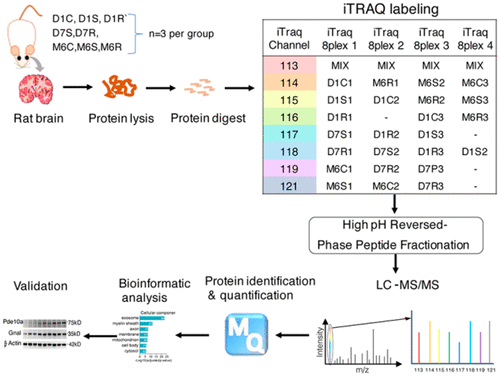当前位置:
X-MOL 学术
›
J. Proteome Res.
›
论文详情
Our official English website, www.x-mol.net, welcomes your
feedback! (Note: you will need to create a separate account there.)
Quantitative Proteomic Study Reveals Up-Regulation of cAMP Signaling Pathway-Related Proteins in Mild Traumatic Brain Injury
Journal of Proteome Research ( IF 3.8 ) Pub Date : 2017-12-27 00:00:00 , DOI: 10.1021/acs.jproteome.7b00618 Hai Song 1, 2 , Shanhua Fang 3 , Jing Gao 4 , Jiaxong Wang 1, 2 , Zhenzhen Cao 5 , Zeyun Guo 5 , Qiongping Huang 4 , Yongqang Qu 1 , Hu Zhou 3, 4 , Jianyun Yu 1
Journal of Proteome Research ( IF 3.8 ) Pub Date : 2017-12-27 00:00:00 , DOI: 10.1021/acs.jproteome.7b00618 Hai Song 1, 2 , Shanhua Fang 3 , Jing Gao 4 , Jiaxong Wang 1, 2 , Zhenzhen Cao 5 , Zeyun Guo 5 , Qiongping Huang 4 , Yongqang Qu 1 , Hu Zhou 3, 4 , Jianyun Yu 1
Affiliation

|
Traumatic brain injury (TBI), as a neurological injury, becomes a leading cause of disability and mortality due to lacking effective therapy. About 75% of TBI is mild traumatic brain injury (mTBI). However, the complex molecular mechanisms underlying mTBI pathophysiology remains to be elucidated. In this study, iTRAQ-based quantitative proteomic approach was employed to measure temporal-global proteome changes of rat brain tissues from different time points (1 day, 7 day and 6 months) post single mTBI (smTBI) and repetitive mTBI (rmTBI). A total of 5169 proteins were identified, of which, 237 proteins were significantly changed between control rats and mTBI model rats. Fuzzy c-means (FCM) clustering analysis classified these 237 proteins into six clusters according to their temporal pattern of protein abundance. Functional bioinformatics analysis and protein–protein interaction (PPI) network mapping of these FCM clusters showed that phosphodiesterase 10A (Pde10a) and guanine nucleotide-binding protein G (olf) subunit alpha (Gnal) were the node proteins in the cAMP signaling pathway. Other biological processes, such as cell adhesion, autophagy, myelination, microtubule depolymerization and brain development, were also over-represented in FCM clusters. Further Western Blot experiments confirmed that Pde10a and Gnal were acutely up-regulated in severity-dependent manner by mTBI, but these two proteins could not be down-regulated to basal level at the time point of 6 months post repetitive mTBI. Our study demonstrated that different severity of mTBI cause significant temporal profiling change at the proteomic level and pointed out the cAMP signaling pathway-related proteins, Pde10a and Gnal, may play important roles in the pathogenesis and recovery of mTBI.
中文翻译:

定量蛋白质组学研究揭示轻度颅脑损伤中cAMP信号通路相关蛋白的上调
由于缺乏有效的治疗方法,创伤性脑损伤(TBI)作为一种神经损伤,已成为导致残疾和死亡的主要原因。大约75%的TBI为轻度脑外伤(mTBI)。然而,mTBI病理生理学的复杂分子机制仍有待阐明。在这项研究中,基于iTRAQ的定量蛋白质组学方法被用于测量单个mTBI(smTBI)和重复性mTBI(rmTBI)后不同时间点(1天,7天和6个月)大鼠脑组织的时间-全局蛋白质组变化。总共鉴定出5169个蛋白,其中237个蛋白在对照大鼠和mTBI模型大鼠之间发生了显着变化。模糊c均值(FCM)聚类分析根据这237种蛋白的蛋白质丰度的时间模式将其分为六个簇。这些FCM簇的功能性生物信息学分析和蛋白质-蛋白质相互作用(PPI)网络图谱表明,磷酸二酯酶10A(Pde10a)和鸟嘌呤核苷酸结合蛋白G(olf)亚基α(Gnal)是cAMP信号通路中的节点蛋白。其他生物过程,例如细胞粘附,自噬,髓鞘形成,微管解聚和大脑发育,在FCM簇中也被过度代表。进一步的Western Blot实验证实,mTBI以严重性依赖性方式急性上调了Pde10a和Gnal,但在重复性mTBI后6个月的时间点上,这两种蛋白无法下调至基础水平。
更新日期:2017-12-27
中文翻译:

定量蛋白质组学研究揭示轻度颅脑损伤中cAMP信号通路相关蛋白的上调
由于缺乏有效的治疗方法,创伤性脑损伤(TBI)作为一种神经损伤,已成为导致残疾和死亡的主要原因。大约75%的TBI为轻度脑外伤(mTBI)。然而,mTBI病理生理学的复杂分子机制仍有待阐明。在这项研究中,基于iTRAQ的定量蛋白质组学方法被用于测量单个mTBI(smTBI)和重复性mTBI(rmTBI)后不同时间点(1天,7天和6个月)大鼠脑组织的时间-全局蛋白质组变化。总共鉴定出5169个蛋白,其中237个蛋白在对照大鼠和mTBI模型大鼠之间发生了显着变化。模糊c均值(FCM)聚类分析根据这237种蛋白的蛋白质丰度的时间模式将其分为六个簇。这些FCM簇的功能性生物信息学分析和蛋白质-蛋白质相互作用(PPI)网络图谱表明,磷酸二酯酶10A(Pde10a)和鸟嘌呤核苷酸结合蛋白G(olf)亚基α(Gnal)是cAMP信号通路中的节点蛋白。其他生物过程,例如细胞粘附,自噬,髓鞘形成,微管解聚和大脑发育,在FCM簇中也被过度代表。进一步的Western Blot实验证实,mTBI以严重性依赖性方式急性上调了Pde10a和Gnal,但在重复性mTBI后6个月的时间点上,这两种蛋白无法下调至基础水平。











































 京公网安备 11010802027423号
京公网安备 11010802027423号